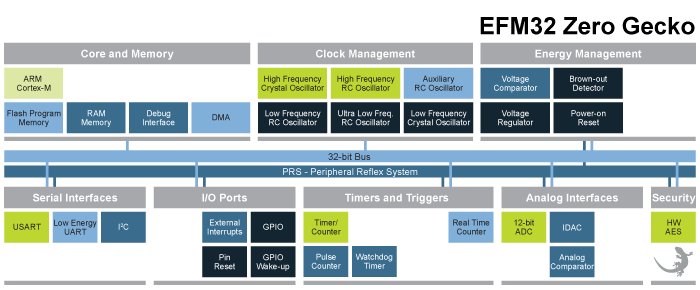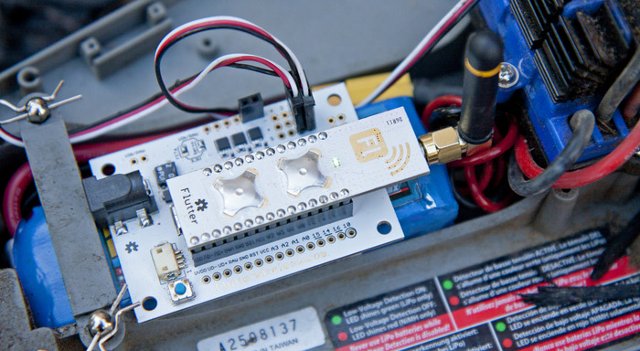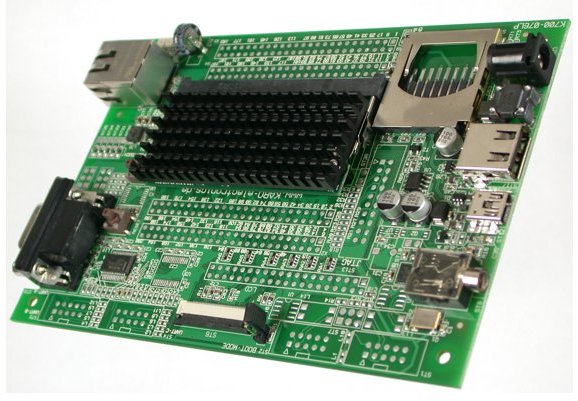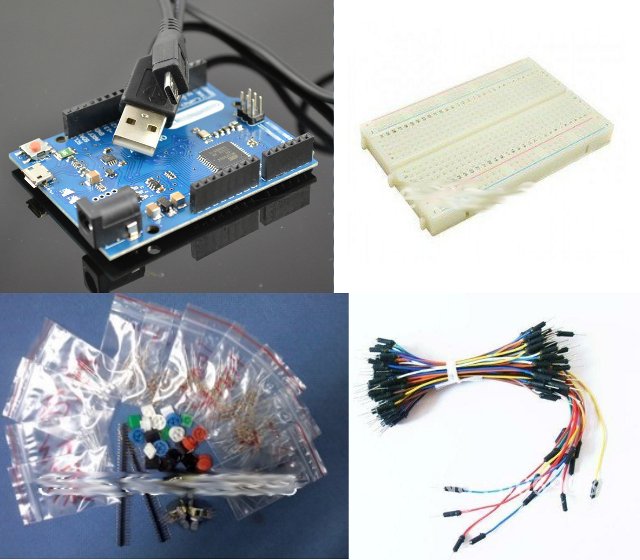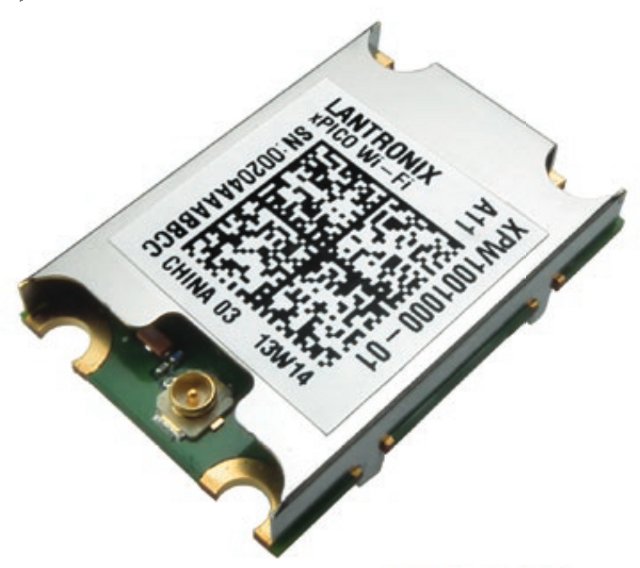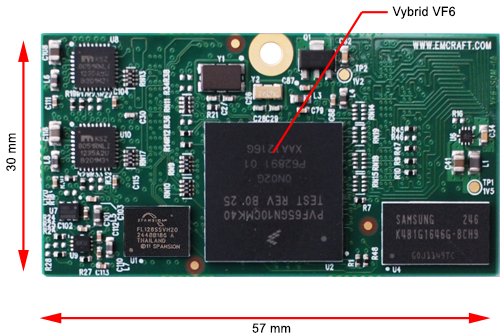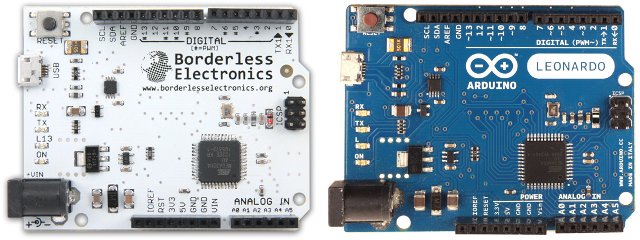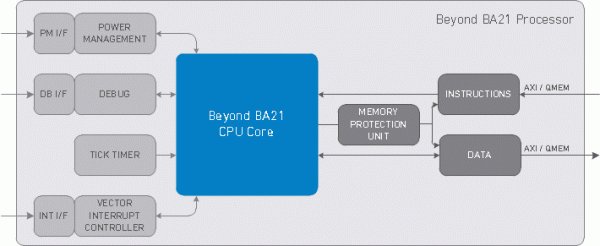Silicon Labs, who bought Energy Micro earlier this year, has recently introduced a new family of 32-bit MCU based on ARM Cortex M0+ called EFM32 Zero Gecko, as well as the corresponding starter kit. These ultra low power MCUs (currently 16 products) are destined to be used in IoT applications such as mobile health and fitness products, smart watches, activity trackers, smart meters, security systems and wireless sensor nodes, as well as battery-less systems powered by harvested energy. The key features of this family include: ARM Cortex-M0+ core @ 24 MHz 4kb to 32 kB flash and 2kb to 4 kB RAM memory 17 to 37 GPIO Single 1.85–3.8 V power supply 5 Power modes Hardware AES (Some models only) -40° to 85 °C operation range Package options: QFN24, QFN32 and QFN48 EFM32ZG222F32, the Zero Gecko MCU with the most memory and features, has the following specifications: ARM Cortex-M0+ CPU […]
$25 Flutter is a Wireless Arduino compatible Board with Up to 1 km Range
There are already several ways to add wireless connectivity to your hardware project. For short ranges, we can use protocols such as Bluetooth (e.g. RFDuino, BLEDuino projects, or Bluetooth USB dongle), for much longer ranges 3G/4G connectivity may be required, and achievable via a 3G/4G USB dongle, or SparqEE CELLv1.0 project for example. But what if you want something in the middle with a range closer to 1km? Flutter boards using the 915MHz band (US only) can provide such range, and are software compatible with the Arduino. There are two version of the board: Flutter Basic – Board with an low-profile integrated antenna. It features micro USB for power, an LED, and a button, as well as several digital and analog I/O. Flutter Pro – Board with external antenna (and probably longer range). It comes with all features found in Flutter Basic, and adds battery charging, an additional button, and […]
$200 Direct Insight Triton-TXEK EvalKit for iMX6 Features Freescale i.MX 6Quad Processor
With Wandboard Quad, SABRE Lite, Nitrogen6X, and UDOO, we already have some choices when it comes to low cost Freescale i.MX 6Quad development platforms. Direct Insight, a British company, has developed another called TRITON-TXEK EvalKit for iMX6 that includes the company’s Triton-TX6Q SoM, for 130 GBP (about $200). TRITON-TXEK for iMX6 Specifications: Specifications listed for the Triton-TXEK evaluation kit include: SoC – Freescale i.MX 6Quad quad core Cortex-A9 @ 1GHz with Vivante GC2000 GPU System Memory – 1GB DDR3 Storage – 128MB NAND flash + SD card slot Display – TFT panel via 40-pin LCD flat cable header Connectivity – 10/100M Ethernet USB – USB 2.0 host + mini USB 2.0 host/device Serial – RS232on D-Sub connector Audio – 3.5mm headphone jack Power Supply – 5V Dimensions – Module: 68mm × 31mm, Baseboard: Who knows… Operating temperature – -20 to 70°C Since the only easily accessible display option is the […]
How to Buy an Arduino Leonardo (Clone) Kit for Less than $20
Borderless Electronics Indiegogo campaign for their $9 electronics kit with an Arduino Leonardo clone went so well that the owner of the campaign decided to limit the total number of boards to 15,000, and basically stop the campaign early to avoid production delays. For $12 ($9 + shipping), you could get a full kit with: Arduino Leonardo clone A mini breadboard with 10 Jumper wires A plug for a 9V battery A few components: 6 LEDs, 10x 330 Ohm resistors, 10x 1 KOhm resistors, 3x push buttons, 2 NPN transistors, 5 diodes, a light sensor, and a sound buzzer A micro USB to USB cable Although they may start a new one campaign in a few months, the campaign is over, and you can’t get this cheap Arduino kit anymore. But one of my reader (onebir) let me know that for less than $20, you can get an Arduino Leonardo […]
Lantronix Unveils xPico Wi-Fi Module For the Internet of Things
With Texas Instruments SimpleLink Wi-Fi CC3000 and Qualcomm Atheros AR4100P embedded Wi-Fi processors that fully handle Wi-Fi internally, and transfer data to an MCU with an SPI interface, and solutions such as Electric Imp, there are already ways to add Wi-Fi at relatively low cost to appliances. There’s now another solution available on the market with Lantronix xPico Wi-Fi Module. Listed features and specification of xPico Wi-Fi: SoC – ARM Cortex M3 class processor with 1MB on-chip Flash and 128 KB SRAM Storage – SPI Flash storage Wireless LAN Interface IEEE 802.11 b/g and IEEE 802.11n (single stream) WLAN interface (2.4 GHz only) IEEE 802.11 d/h/i/j/k/w/r WPS 2.0 support u.FL connector for external antenna Serial Interface Two Serial CMOS Ports (3.3V, 5V tolerant) 300 to 921.6 Kbps Flow control XON/XOFF, RTS/CTS (SPort 1 only) Lantronix tunneling application (SPort 1 only) Host Interface – Dual Serial Port, SPI, USB 2.0 (device), […]
Emcraft Systems Announces Freescale Vybrid VF6 SoM With Cortex A5 CPU and Cortex M4 MCU
Emcraft Systems has recently announced Vybrid VF6 SoM, a System-on-Module powered by Freescale Vybrid VF6 dual core Cortex A5/Cortex M4 SoC with 128MB DDR3, and 512MB Flash, as well as a starter kit composed of VF6 SoM and a carrier board. Emcraft VF6 System-on-Module specifications: SoC – Freescale Vybrid VF6 dual-core microprocessor with the ARM Cortex-A5 (up to 500 MHz) and Cortex-M4 cores (up to 167 MHz). Either MVF61NN151CMK50 (No Security), or MVF61NS151CMK50 (with Security). System Memory – 128 MBytes DDR3 SDRAM; Storage – Up to 512 MBytes NAND Flash, 32 MBytes dual QSPI Flash; Connectivity – Two 10/100 Ethernet interfaces with L2 switch; External interfaces using two 80-pin 0.4 mm-pitch connectors: Two USB 2.0 OTG interfaces Serial console interface at the UART CMOS levels; JTAG interface to the Vybrid VF6 TFT LCD interface Synchronous audio interface (SAI) supporting I2S, AC97 and CODEC/DSP interfaces Multiple serial digital (UART, SPI, I2C, […]
Borderless Electronics Sells $9 Arduino Compatible Starter Kit
The Raspberry Pi fundation, a nonprofit organization, has brought a low cost ARM Linux platform to the masses, and Arduino already did that with electronics, but Harold Timmis, an engineer, found out it was still not cheap enough as he worked as a volunteer teaching electronics at his library. So he (and others) decided to clone Arduino Leonardo, setup a website called Borderless Electronics, and sell it without profit via Indiegogo for just $9 ($12 including shipping). The board is indeed the same as Arduino Leonardo with different color, logo, and name: Microcontroller – Atmel ATmega32u4 @ 16 MHz SRAM – 2.5 KB onchip (ATmega32u4) Flash Memory – 32 KB onchip (ATmega32u4) of which 4 KB used by bootloader EEPROM – 1 KB onchip (ATmega32u4) Operating Voltage – 5V Input Voltage – (recommended) 7-12V | (limits) 6-20V Digital I/O – 20 pins PWM – 7 channels Analog Input – 12 […]
Beyond Semiconductor Announces BA21 Processor Core for Embedded MCUs
Beyond Semiconductor, a Ljubljana, Slovenia based company, has recently announced BA21, a 32-bit processor core, with 2.5 Coremark per megahertz, and clocked up to 125 MHz, that’s roughly equivalent to a Cortex M3 core @ 120 MHz. Target applications include mixed signal embedded processing, wireless communications ICs (e.g. Bluetooth, Zigbee, GPS), industrial Microcontrollers, and battery-powered or ultra-low-cost devices.If you’ve never heard about Beyond Semi, you may want to read my previous article about their BA25 core (Cortex A7/A8 equivalent) for a bit more details about the company. Here are the key features of BA21 core: 32-bit Processor Small silicon footprint (less than 10k gates) for lower leakage and dynamic CPU power Two-stage pipeline architecture Extreme Code Density for lower instruction fetching energy Advanced power management Dynamic clock gating and power shut-off of unused units Software- and hardware-controlled clock frequency Wake-up on tick timer or external interrupt Performance Up to 2.5 […]


